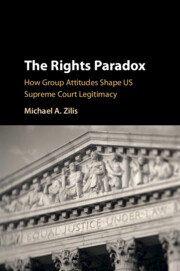Book contents
- The Rights Paradox
- The Rights Paradox
- Copyright page
- Dedication
- Contents
- Figures
- Tables
- Acknowledgments
- Table of Cases
- 1 Legitimacy and Minority Rights
- 2 The Group Antipathy Theory of Supreme Court Legitimacy
- 3 Under Siege
- 4 Opening the Floodgates
- 5 Experimental Tests of the Group Antipathy Model
- 6 How Citizens Use Groups to Evaluate Judicial Preferences
- 7 Group Antipathy and Strategic Behavior on the Supreme Court
- 8 Conclusion
- Appendix
- References
- Index
6 - How Citizens Use Groups to Evaluate Judicial Preferences
Published online by Cambridge University Press: 22 March 2021
- The Rights Paradox
- The Rights Paradox
- Copyright page
- Dedication
- Contents
- Figures
- Tables
- Acknowledgments
- Table of Cases
- 1 Legitimacy and Minority Rights
- 2 The Group Antipathy Theory of Supreme Court Legitimacy
- 3 Under Siege
- 4 Opening the Floodgates
- 5 Experimental Tests of the Group Antipathy Model
- 6 How Citizens Use Groups to Evaluate Judicial Preferences
- 7 Group Antipathy and Strategic Behavior on the Supreme Court
- 8 Conclusion
- Appendix
- References
- Index
Summary
A tense scene transpired outside the 1984 Republican National Convention. To protest the policies of the Reagan administration, members of the Communist Revolutionary Youth Brigade vandalized buildings and staged “die-ins.” The protest culminated as one member set the American flag on fire while others chanted “we spit on you.” Charged with a crime for his actions, Gregory Lee Johnson fought all the way to the Supreme Court. In Texas v. Johnson (1989), the justices found that the First Amendment protected his actions, sparking a firestorm of controversy. While criticism came from all quarters, conservatives were particularly incensed, spearheading a congressional push for a constitutional amendment to protect the American flag (Clark and McGuire 1996). As with earlier controversies, such as the Pentagon Papers case, the ruling seemed to illustrate the proposition that strong First Amendment protections were the product of a liberal Supreme Court.
- Type
- Chapter
- Information
- The Rights ParadoxHow Group Attitudes Shape US Supreme Court Legitimacy, pp. 97 - 107Publisher: Cambridge University PressPrint publication year: 2021



